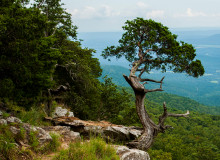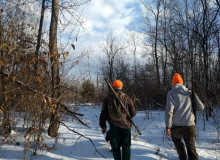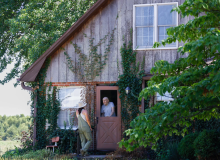Search

The view from a bluff in the Ponca Wilderness in Compton, Arkansas. These lands, like much of what is now the state of Arkansas, are native to Indigenous peoples including the Osage, Sioux, Quapaw, and Caddo. (Image courtesy of Thomas Shahan/Flickr https://creativecommons.org/licenses/by/2.0/).
Digital Editor, Planet Forward
Tuesday, August 10, 2021
Indigenous professor Dr. Bethany Henry Rosenbaum asked a powerful question: How do we bridge the Indigenous understanding that removal of Native people is still impactful today with the Western understanding that it’s in the past?
Tags: Indigenous Knowledge, environmental justice, bio-cultural restoration, Ecosystems, pollution, education, indigenous peoples

Barry Forbes and his grandson hunting in the Cornwall Swamp. (Photos by Oscar Psychas/Middlebury College)
Middlebury College
Tuesday, March 30, 2021
A student new to Vermont visits Cornwall Swamp while tracing his own family's ancestral connection to these mysterious places that reveal deeper truths about our relationship to the natural world.
Tags: nature, wetlands, vermont, florida, Finland, hunting, storyfest2021

Jordan Welch talks to her grandfather Charlie Payne on July 20 in Concordia. Charlie Payne purchased the Payne family’s land more than 60 years ago, and he still helps out in an advisory capacity on the farm. (Jia Wu/Columbia Missourian)
University of Missouri
Wednesday, February 08, 2023
Climate change is redrawing the agricultural map of the United States. As corn becomes less economically viable with changing Midwestern weather patterns, farmers look to a more diverse future.
